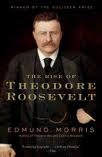 |
| Amazon |
 |
Roosevelt’s exhilaration at finding himself a hero (already there was talk of a Medal of Honor) and, by virtue of his two charges, senior officer in command of the highest crest and the extreme front of the American line, was so great that he could not sit, let alone lie down, even in the midst of a surprise bombardment at 3:00 A.M. A shell landed right next to him, besmirching his skin with powder, and killing several nearby soldiers; but he continued to strut up and down, 'snuffing the fragrant air of combat,' silhouetted against the flares like a black lion rampant."
After the jump, my review.
Grade: B-
Everyone thinks they know Teddy Roosevelt - big game hunter, rancher, government reformer, Rough Rider, the President enshrined on Mount Rushmore. The legends surrounding the man make him ideally suited for children's books, which in turn make him subject to caricature. Edmund Morris's 1979 biography (winner of the Pulitzer Prize and National Book Award) lays out the history behind those legends. Roosevelt's reputation rises in my estimation as I realize just how much fact was behind the legend.
I'll highlight only one example. I'd always just assumed that the story of Teddy Roosevelt charging up San Juan Hill with the Rough Riders exaggerated a minor skirmish, maybe more photo op than real battle, for purposes of public relations to advance an ambitious politician's career or increase the circulation of a newspaper. It turns out that the battle was the major engagement of the war, was deadly serious, and Roosevelt did, indeed, lead his regiment in two charges that put his own life at risk as much as any of his men. That Roosevelt had a safe desk job in Washington (Assistant Secretary of the Navy) when he volunteered for active duty in harm's way in Cuba may be reason enough to consider Roosevelt worthy of his place on Mount Rushmore.
Morris's biography covers much more than this Rough Rider episode. The Rise of Theodore Roosevelt is the first volume in a three-volume biography. Roosevelt's greatness comes through again and again in his life story, even well before he ascended to the Presidency upon the assassination of President William McKinley, which marks the concluding passage of this volume. Morris's telling is aided by the huge amount of source material left behind by Roosevelt. He was a critically acclaimed author of numerous books, a prodigious letter writer, a lifelong diarist, and spent years in and out of government service, leaving mounds of official paperwork behind. Sometimes Morris reconstructs Roosevelt's story. Often he quotes liberally from these sources. Even though the full three-volume biography is massive, the reader gets the feeling that Morris's biggest challenge was culling the source material down to even this length.
Roosevelt's politics are not easy to pigeonhole. He doesn't fit neatly into either the modern Republican or Democratic parties, but his goals were grand enough that both parties still find plenty to praise in his accomplishments. Unfortunately, Morris sticks to relating the facts and doesn't do enough to inform the modern reader how Roosevelt shaped modern American politics.
If all you know of Teddy Roosevelt is what you learned in childhood, or what you hear modern politicians say when they want some of his distant shine to rub off on them, it's well worthy reading this biography. The real man was even more remarkable than what you've heard.
Excerpts:
"Recrossing the Atlantic in late October, Teedie turned fifteen. He was now, if not yet a man, then at least a youth of more than ordinary experience of the world. He had traveled exhaustively in Britain, Europe, North Africa, and the Middle East, visiting their great cities time and again and actually living in some for long periods. He had plumbed the Catacombs and climbed the Great Pyramid, slept in a monastery and toured a harem. He had hunted jackals on horseback, kissed the Pope’s hand, stared into a volcano, traced an ancient civilization to its source, and followed the wanderings of Jesus. He had been exposed to much of the world’s greatest art and architecture, become conversant in two foreign languages, and felt as much at home in Arab bazaars as at a German kaffeeklatsch, or on the shaven lawns of an English estate."
"He asked Bill Sewall, as he had Professor Laughlin, whether he should go into science or politics after he graduated. 'You may laugh, but I have a presentiment that some time I may be President.'"
"Commander Gorringe had just been West, and was in the process of opening a hunting ranch there himself. When Roosevelt wistfully remarked that he would like to shoot a buffalo 'while there were still buffalo left to shoot.'"
"Nine years before, in his Fourth of July oration to the cowboys of Dickinson, he had hoped 'to see the day when not a foot of American soil will be held by any European power,' and instinct told him that that day was fast approaching. When it came, it would bring out what some consider the best, what others consider the worst in him. This overriding impulse has been given many names: Jingoism, Nationalism, Imperialism, Chauvinism, even Fascism and Racism. Roosevelt preferred to use the simple and to him beautiful word Americanism."
"As Cecil Spring Rice remarked, 'Teddy is consumed with energy as long as he is doing something and fighting somebody -- he always finds something to do and somebody to fight. Poor Cabot must be successful; while Teddy is happiest when he conquers but quite happy if he only fights.'"
"This terror, this premonition of a national disaster should Roosevelt be allowed to stand at McKinley’s side, was entirely new. At last Hanna, losing all self-control, blurted it out. 'Don’t any of you realize that there’s only one life between this madman and the Presidency?'"

No comments:
Post a Comment